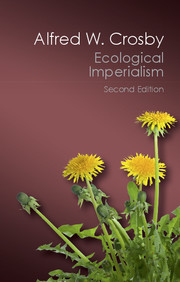Book contents
- Frontmatter
- Dedication
- Epigraph
- Contents
- List of Illustration
- Preface to the new edition
- Acknowledgments
- 1 Prologue
- 2 Pangaea revisited, the Neolithic reconsidered
- 3 The Norse and the Crusaders
- 4 The Fortunate Isles
- 5 Winds
- 6 Within reach, beyond grasp
- 7 Weeds
- 8 Animals
- 9 Ills
- 10 New Zealand
- 11 Explanations
- 12 Conclusion
- Appendix: What was the “smallpox” in New South Wales in 1789?
- Notes
- Index
4 - The Fortunate Isles
Published online by Cambridge University Press: 05 October 2015
- Frontmatter
- Dedication
- Epigraph
- Contents
- List of Illustration
- Preface to the new edition
- Acknowledgments
- 1 Prologue
- 2 Pangaea revisited, the Neolithic reconsidered
- 3 The Norse and the Crusaders
- 4 The Fortunate Isles
- 5 Winds
- 6 Within reach, beyond grasp
- 7 Weeds
- 8 Animals
- 9 Ills
- 10 New Zealand
- 11 Explanations
- 12 Conclusion
- Appendix: What was the “smallpox” in New South Wales in 1789?
- Notes
- Index
Summary
The fortunate isles or the isles of the blessed “abound in fruit and birds of every kind … These islands, however are greatly annoyed by the putrefying bodies of monsters, which are constantly thrown up by the sea.”
–The Natural History of Pliny (first century A.D.)In 1291, The crusaders lost acre, the last Christian stronghold in the Holy Land, and, coincidentally, two Genoese brothers, Vadino and Ugolino Vivaldi, sailed out past Gibraltar into the Atlantic with the intention of circling Africa. Not surprisingly, they were never seen again. Their voyage, in and of itself, had little significance, but its implications were of transcendent importance. The Vivaldi venture was the beginning of the most important new development for the human and many other species since the Neolithic Revolution. European sailors and imperialists were now ready to try their luck in the latitudes where the Atlantic was warm, if deplorably wide.
The Vivaldis may not have died at sea or on the coast of Africa. Even in their unseaworthy craft they could have reached the Canaries, Madeiras, or Azores, all within a week or two of Gibraltar, given favorable weather. The Canaries, certainly, and the other two groups, possibly, had been known to the Romans and other sailors of the ancient Mediterranean world, and named by them the Fortunate Isles. However, Europe forgot or at least misplaced them during the centuries of Rome's decline and the Middle Ages. The sailors of Europe's Renaissance discovered or rediscovered them and made them laboratories for a new kind of European imperialism. The transoceanic empires of Charles V, Louis XIV, and Queen Victoria had their prototypes in the colonies on the islands of the eastern Atlantic.
In 13363 Lanzarote Malocello, following in the Vivaldis' wake, came upon the most northeasterly of the Canary Islands, which still bears his name, Lanzarote, where he settled and was killed by the native Canarians, the Guanches, some years later. During the fourteenth century, the Italians, Portuguese, Majorcans, Catalans, and, no doubt, other Europeans sent individual ships and expeditions to the Canaries and to the other archipelagos opposite Iberia and Morocco, the Madeiras and Azores, as they were discovered.
- Type
- Chapter
- Information
- Ecological ImperialismThe Biological Expansion of Europe, 900–1900, pp. 70 - 103Publisher: Cambridge University PressPrint publication year: 2015



